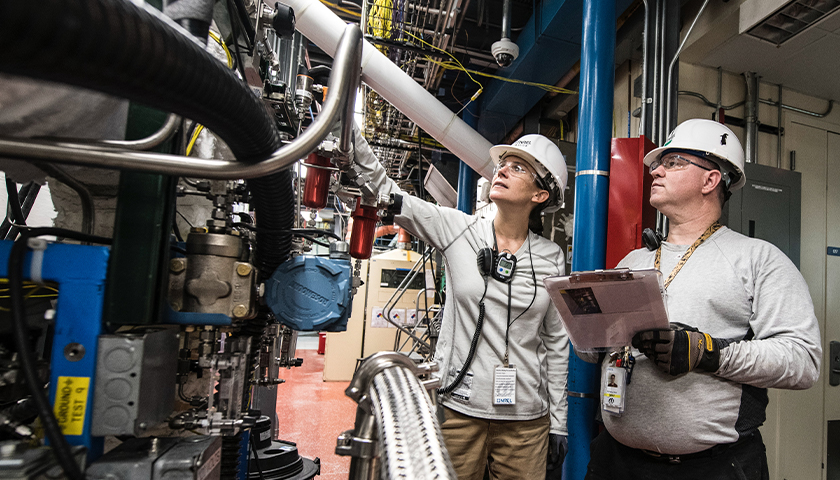Despite Tennessee ranking as one of the best states in the United States for business, the migration of Volunteer State jobs overseas has remained a closely watched issue for decades.
Tennessee has done more to combat this issue than most states – in fact, we became the very first in the nation to restrict the public sector’s offshoring to some degree. Unfortunately, there’s only so much that our own statehouse can do to combat the problem. The bulk of the outsourcing epidemic is a federal, not state, issue.
Thankfully, after years of Washington politicians tolerating the status quo, and – by default – tying the hands of Tennessee’s workers, President Trump has declared war on outsourcing of U.S. jobs. Blue-collar workers in Tennessee have been reaping the benefits; nevertheless, in the new year, will rogue corporate interests form a roadblock that prevents many of the state’s workers from realizing further gains?
To underscore the blasphemy of these big business efforts, let’s start this conversation by detailing the overwhelming success of the president’s business-friendly, anti-outsourcing campaign.
It all started with the Tax Cuts and Jobs Act. Before the passage of this sweeping reform bill, the U.S.’s top corporate income tax rate bracket sat at 35-percent. That was the highest in the industrialized world, and it gave U.S. businesses no choice but to ship jobs abroad.
By lowering that rate to just below the average for other OPEC countries, President Trump’s legislation created an estimated 4,400 new Tennessee jobs in 2018 alone. Factories and corporations began opening and expanding within the state at paces not realized in years.
Recently, the Trump administration also succeeded in getting Congress to agree to its USMCA trade deal with Canada and Mexico. USMCA will replace NAFTA, a trade agreement that allowed Mexico to suppress their workers’ rights and wages to entice U.S. businesses to move abroad. NAFTA has been nothing but devastating for Tennessee. The Economic Policy Institute found that Tennessee lost over 16,000 jobs because of the spike NAFTA caused to the U.S.-Mexico trade deficit – and that was in 2010. It was high time for change, and the Trump administration delivered it. It’s remarkable how, in just three years, the president has completely changed the competitive standing of the U.S. – especially considering how little changed in the decades prior. Unfortunately, however, despite the business-friendly environment the administration has bended over backward to create, the U.S. is still not immune to cheats that try to game the system. This is not the fault of the administration; it’s always an inevitability. Even if the president lowered the corporate rate to 0-percent, there would still be bad actors looking to capitalize on unclosed loopholes.
In Tennessee, the jobs under the most significant, immediate threat from corporate manipulation are approximately 1,000 manufacturing positions in Middleton. These jobs come from Thyssenkrupp, an elevator manufacturing company that has virtually employed the entire city for years. The trouble is that Kone – a business that is well- known for outsourcing jobs overseas – is attempting to acquire its elevator unit.
Kone’s acquisition of Thyssenkrupp’s business would reduce the number of competitors in the market from 4 to 3. Eighty percent of 4-to-3 mergers are challenged when the data suggests it will weaken competition. With Kone’s history of offshoring U.S. jobs, it’s a no brainer that this merger should fall under this umbrella. In fact, the company has already proposed to pay an over $3 billion upfront breakup fee. Such fees almost always indicate that the buyer expects to profit quickly through outsourcing and raising prices to reduce competition.
There is no reason for U.S. companies to be engaging in such anti-competitive, anti-free market activity – not when the Trump administration has put so much effort into leveling the global paying field.
Tennessee has already seen so many once prosperous municipalities falter because of predatory actions that are eerily seem similar the ones Kone has taken in other parts of the country over the years. Just look at Bruceton and Hollow Rock, where many residents still consider their homes to be “modern-day ghost towns” because of the outsourcing caused by NAFTA that has left entire business strips vacant.
Tennessee’s lawmakers can’t afford to let it happen again. The entire Middleton economy hinges upon those jobs. The Tennessee delegation, including Sen. Marsha Blackburn, Sen. Lamar Alexander, and Congressman Scott Desjarlais needs to ensure that this possible merger with Kone is on the administration’s radar and that it is adequately vetted.
The White House has put so much effort into protecting U.S. workers at home, but it can’t monitor the entire U.S. economy all on its own. It would be a shame if a few corporate interests prevent many residents of the Volunteer State from noticing their effects. Here’s hoping that Tennessee’s representatives in Washington help out and maintain watchful eyes.





